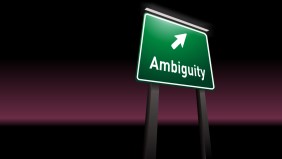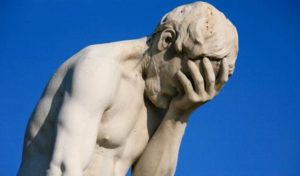Category: Cultivating Connection
August 1st, 2019

Let’s face it. Most of us really like certainty. It’s just so much easier to see the black or white in any situation than to muddle around in shades of grey. As the Democratic Presidential contenders do their debate thing, aren’t we hoping for a clear, clean message that shows a way forward, one way or another? Case closed.
Yet, life isn’t like that.
More and more, I’m realizing that moving from Certainty to Ambiguity, to a place of curiosity and wonder, is harder to come by but well worth the effort. It takes a commitment on my part to dig deeper, push past my judgments and reactions. And do it with compassion and grace. To stay still, within myself, and offer what I know about myself, rather than self-righteously telling someone else what I see is ‘wrong’ with them. Or worse, feeling it but not saying anything (which will bleed out in some passive aggressive way later, to be sure).
I’ve shared Kim Scott’s model of Radical Candor before, and while it
still applies to many situations, what I’m talking about here has more to do
with Transactional
Analysis. In large part because when
I’m ‘stuck’ in a place of Certainty, because I see myself as right and/or
others as wrong, so that I can take comfort in my black and white analysis, I’m
almost always operating out of my old child self – protecting, defending,
rationalizing my position.
When I can return to my present self, willing to live within
the ambiguity that the present almost always requires, I find my way back to a
connection with others that is far more satisfying and productive. Yes, uncomfortable at first (not black or
white, and that makes me squirm), but healthy in that curious, wondering, willing
to look at my own shit kind of way.
I do hope the Democrats take a look at their shit and figure
this out, sooner than later.
Thanks for listening.
Let me know your thoughts when you have a chance.
Peter
December 11th, 2016
Disappointment, loss, grief, and, shock (DLGS). That was my November. Especially on the morning of 11/9, which was especially shocking, as shocking in fact as the events of 9/11 (a numerologist would have a great time with that one).
For me, all of this DLGS on 11/9 was about to be fully sandwiched by two other events, full of disappointment, loss and grief. First, the somewhat sudden passing of my 42-year old godson, on Halloween. I had just been in touch with his mom, one of my oldest, dearest friends, as she was helping him move into hospice, and I was planning on arriving the next day to see them. Then, within a few hours of getting settled at hospice, he was gone.
The sandwich on the other side was a memorial service on 11/15 for a long-standing coaching client from one of my all-time favorite teams. He was an incredible inventor (including the Craisin). A great story teller. A wonderful family man. Only 59 years old. Fine one minute. Gone the next.
The silver lining, right in the middle of all this loss and grief, was a delightful dinner party, hosted by my old friend Katie, who had been planning on having a dozen of us over to celebrate the election results. Which as you may have guessed turned into a somber, soul-searching evening. No celebrating for us.
Yet, our hostess had the wisdom, and the will, to lead us on a process of active listening, and deep sharing. Each of the dinner guests took turns first introducing ourselves and explaining our connection to our host & hostess. Then, at the dinner table, Katie asked us to share how we were feeling, what we were thinking. With rapt intent, we listened as each person made their personal accounting of how deeply troubled and concerned we were by what had just happened, and what may yet come to pass – post-election, mid-shock, still stunned.
Having that unexpectedly yet wonderfully intimate, deeply personal (yet in some ways universal) description of where each person was, right at this exact moment in time, had me feeling better already. Uplifted beyond belief. Just knowing that others were in a similar place, and hearing where they might go from here, brought a ray of hope and possibility.
I was particularly struck by our host’s description of how he felt like he has been living in a bubble. Actually, a bubble within a bubble. Living on an idyllic, socially responsible, working farm (first bubble), located in the State of VT (bigger bubble; Bernie’s bubble).
The whole experience left me thinking of David Whyte’s missive on Disappointment:
The measure of our courage is the measure of our willingness to embrace disappointment, to turn towards it rather than away, the understanding that every real conversation of life involves having our hearts broken somewhere along the way and that there is no sincere path we can follow where we will not be fully and immeasurably let down and brought to earth, and where what initially looks like a betrayal, eventually puts real ground under our feet.
The great question in disappointment is whether we allow it to bring us to ground, to a firmer sense of our self, a surer sense of our world, and what is good and possible for us in that world, or whether we experience it only as a wound that makes us retreat from further participation.
Disappointment is a friend to transformation, a call to both accuracy and generosity in the assessment of our self and others, a test of sincerity and a catalyst of resilience. Disappointment is just the initial meeting with the frontier of an evolving life, an invitation to reality, which we expected to be one particular way and turns out to be another, often something more difficult, more overwhelming and strangely, in the end, more rewarding.
More rewarding if we each commit to behaving as Leaders. Step out of our bubbles. Better yet, burst out of our bubbles. No more sheep. No more checking out, letting others lead, or just waiting for the world to change (as John Mayer sang once). Time to step up. Engage openly, honestly, compassionately with others. Even if, especially if, they don’t come from our old, safe, self-replicating bubble. 
Lead on my friends!
March 9th, 2016
You must be logged in to view this post.
October 10th, 2012
Last week, while making the drive from my New York office up to my Vermont office, coming up Route 22A where it enters VT, I was  suddenly and vividly reminded of why I chose VT as my escape route out of the metropolitan suburbs of the 60’s. Three things struck me: 1) the vast open sky that seems to stretch out forever, though it’s nicely framed by the Adirondacks on one side and the Green mountains on the other; 2) the unobstructed landscape below – gracefully assisted by the lack of billboards, thanks to the foresight of VT’s Legislature in the 60’s, and, 3) the small number of houses, and consequently a landscape that not only allowed for but actively promoted long, slow, deep breathing.
suddenly and vividly reminded of why I chose VT as my escape route out of the metropolitan suburbs of the 60’s. Three things struck me: 1) the vast open sky that seems to stretch out forever, though it’s nicely framed by the Adirondacks on one side and the Green mountains on the other; 2) the unobstructed landscape below – gracefully assisted by the lack of billboards, thanks to the foresight of VT’s Legislature in the 60’s, and, 3) the small number of houses, and consequently a landscape that not only allowed for but actively promoted long, slow, deep breathing.
So what does any of this have to do w/ mentoring? Well, while I did have some very significant mentors growing up outside of NYC, my most memorable and meaningful mentors have mostly been here in VT. Starting with my first career as an educator, Sandra Wyner, a strikingly beautiful South African woman who studied Montessori with Maria’s son Mario, in Bergamo, Italy, the way it was meant to be taught; with the focus on the student, the teacher a mere facilitator and resource provider. Sandra and I started a modified-Montessori, parent-cooperative elementary school in 1976 that is still going strong today. She mentored me in the art of individualized education, collaborative process and transactional analysis (a system for personal growth and personal change.)
The 80’s led me out of teaching and into the realm of business, where I had the good fortune to work side-by-side with many amazingly bright and talented individuals. My most memorable mentor was a scrappy old codger named Hank Adams, who hired me to serve as General Manager at his thriving mechanical services business, and was a mentor to me in ways I’m still learning from. Although Hank had to leave high school to help his father run his business, he had the kind of business savvy that just can’t be learned pursuing an MBA. For example, when considering recruiting for key positions as we were growing the business, he would challenge my pedigreed aspirants, shiny resumes and all, with the phrase “someone we know, even if they’re only a middle-of-the-road leader, is always preferable to the unknown know-it-all.” Understanding and developing leaders takes time and commitment. Short cuts should be few and far between.
By the time the 90’s came around I realized that I needed to cultivate my leadership capabilities both inside and outside the workplace. I ran for our local school board and had the good fortune to initially serve on the board with the superintendent, Fred Tuttle. Fred was not only a kind, intelligent, humble, compassionate leader, with over forty years of experience in the field, he knew that the business of education was really the business of people. He had the ability to connect with people, all kinds of people – directly, deeply and most importantly, meaningfully. He taught me, by example, more about how great leaders can build connections, than any other leader I’ve had the good fortune to mentor under.
Around the turn of the millennium, I met, and mentored under, a colleague, Dean Lea, who is a Renaissance man extraordinaire. Although he hadn’t practiced as a pharmacologist for years, Dean understood the essence of that field, part alchemist, part researcher, facilitator, advocate, life -long learner. As an arborist, he brought some of those same skills to his apple orchards. As an organizational development consultant and executive coach, he used all of those and more. And on top of all that, he has taught me that one’s quirkiness (and Dean can be quite quirky) is to be cherished, not suppressed.
And, of course, mentoring is at its best when it goes both ways. For years now I’ve considered it an honor to provide the mitzvah of mentoring, particularly to young people between jobs and/or careers. My way of giving back, paying it forward. So what an added bonus when I had the opportunity to begin formally mentoring my daughter, Alexa, when she agreed to come to work for me earlier this year. She’s always had an affinity for coaching work, the ‘go-to girl’ not only with her friends but also folks of all ages and backgrounds. A great listener, compassionate to the core and always ready, willing and able to lend a hand to help get things done. Together, we have studied the art of effective communication, creative business problem solving and how to lead by example.
The best of both worlds.
Giving and getting.
It doesn’t get much better than that.
September 17th, 2012
New Editions/Understanding Ourselves:
Time Management Sheet – by Cole Consulting. This is a two-pager that is great for helping you find more time in your day that you love to do.Enjoy!
Turning 60: The Twelve Most Important Lessons I’ve Learned So Far – by Tony Schwartz. Schwartz co-authored with renowned Performance Psychologist, Jim Loehr, “Managing Your Energy, Not Your time,” and is the founder of the The Energy Project. He is highly regarded in his field and has contributed a great deal to our work. This is a beautiful, introspective, and wise account of the lessons he has learned over the course of his life.
New Editions/Understanding Others:
How to Facilitate Rather than Direct Meetings – by Cole Consulting. This is a great explanation of what it means to facilitate as a leader. When facilitating a meeting (or conversation) you are giving the group, or person, the opportunity to share openly with you rather than following your lead as Director of the conversation. That being said, the facilitator does not take a passive role in the conversation. Read on to gain real knowledge and see hands on steps for being a great facilitator, and a better leader.





